Almost exactly 4 years later, in October 2013, I went backpacking to Asia again. My wife and I decided to go Sri Lanka, since it is a bit more wild than Thailand, but still not as chaotic as India. For three weeks we've travelled around the country, enjoying the madness of urban cities, mysteries of ancient ruins, beholding the majestic nature and loving the beautiful beaches. This diversified land can offer a lot to a traveler, and you don't need that much money to do a lot of different things. You just need to be prepared for an amazing adventure that this small island on the coast of India can provide.
Travelling
Sri Lanka is a relatively small island, around 300km north to south. But this doesn't mean you'll get around fast. The roads are old, the trains are slow. Luckily, there are a lot of things you can see while moving from one place to another.
We've tried pretty much all means of transportation. We've liked buses the most, since there are extremely frequent and cheap (around 1 Euro or 150 Rupees per person per 100km), and you get to meet the locals and enjoy a bit of genuine life. The buses are a piece of art themselves, often filled with kitschy accessories and huge speakers playing local music. There aren't two alike. But make sure you're ready for a roller-coaster ride - the bus drivers are fucking insane, dangerously overtaking other busses and literally pushing smaller vehicles out of the road. The driver sits on the horn, the conducter waves through the window.
A bit of a downside are the bus stations, which are extremely stressful and chaotic, but you get used to them after a few times.Try to avoid the red buses, these are run by the national operator and are a bit older, go for the colorful ones if you have the chance.
We've tried the taxi van as well, it was much faster and comfortable than the bus, and the driver showed us a few things on the way. But the ride was really expensive (around 50 Euro a day), so not really worth the money. Of course, Tuk-tuks are useful as well (not to mention cool), but not suitable for longer drives.
We've had a funny issue with the train. At one time, we've booked an expensive panoramic tour through the jungle from Kandy to Nouwera Eliya, and the train was 3 hours late. The panoramic cart turned out to be not-so-panoramic, the third class (which we took on another occasion) was almost better. Not to mention the train broke down in the middle of the jungle in the evening and another locomotive came a few hours later to tow us to the nearest station. Luckily, it was our station.
So, trust me on this one: use the busses whenever you can, they are one of the coolest, craziest and most authentic things you can do in Sri Lanka.
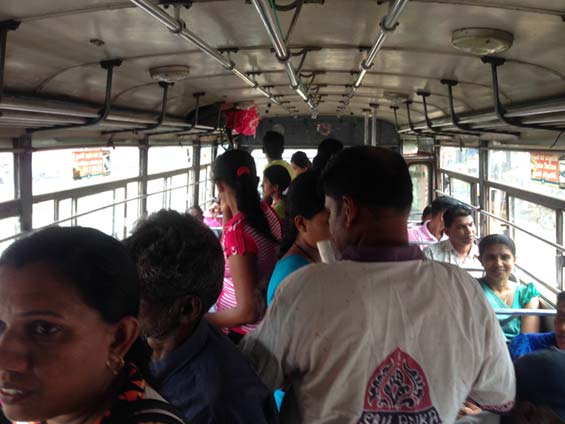
Welcome aboard the red bus.

The colorful one is the good one.
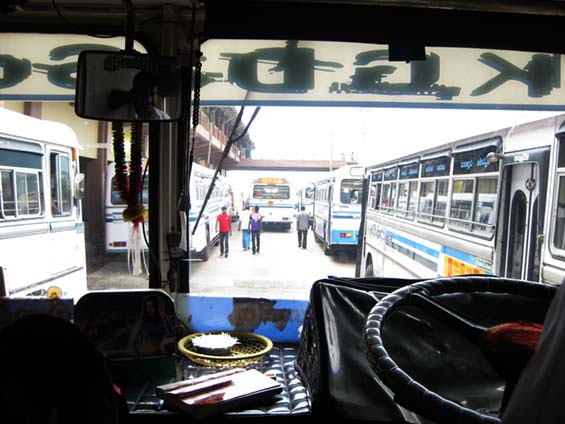
The stations are filled with buses and loud people.
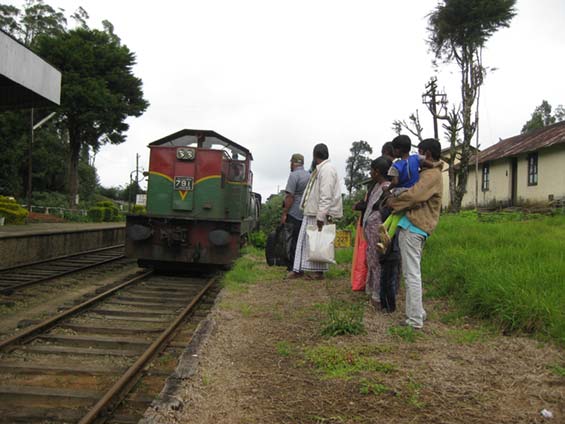
Let's take a train instead.
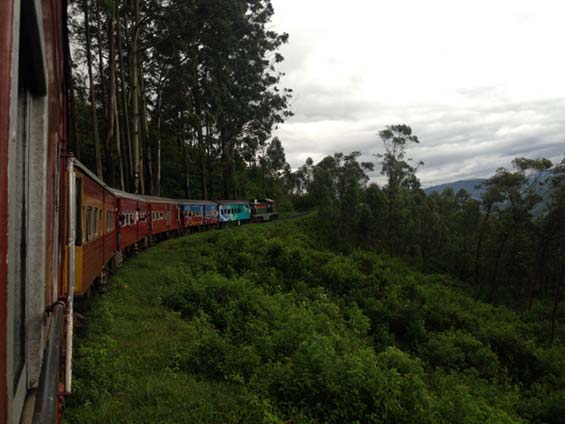
Stuck in the jungle much?
Sleeping
It's easy to find a nice place to sleep anywhere in Sri Lanka. The combination of Lonely Planet and Trip Advisor works like a charm, but make sure you bring an extra telephone, so you can install a local sim card, which can help you to contact the hostels easily. You can get a prepaid one for a few bucks and it has enough credit on for the whole trip.
Except in Colombo, where we've booked our stay in advance, we've picked places as we went along. Usually, we looked for double rooms in the range of 10-20 Euro (around 1.500 to 3.000 Rupees) a night with wi-fi, but without A/C (even though it was hot in October, we've survived with the fan). In all cases, the rooms were nice and clean, so if you don't need much luxury, this type of accommodation will be enough for an average backpacker.
Colombo was a bit more expensive, and we've made another excess by booking a beach cabana only for ourselves for one night in Tangalle (both for around 40 Euro a night). Otherwise, our budget sleeping offered very good value for the money.
Speaking of the cabana…this beach house was one of the sexiest things we've done on our trip, but not all is gold that glitters. Since the cabana was open and on the seaside, I've had a bit of a hard time sleeping because of the wind and the ocean. But it felt great to be a king in paradise, if only for a day.
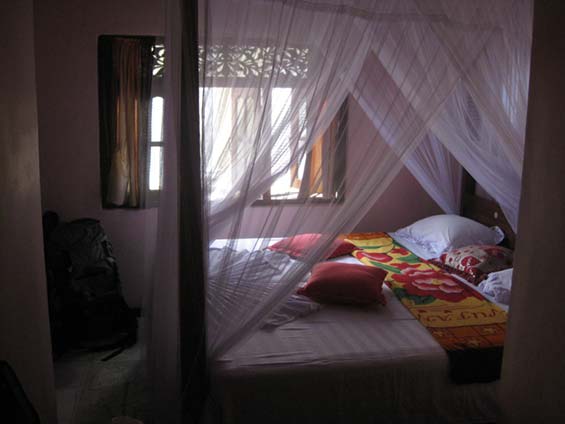
Our room in Fort In in Galle.
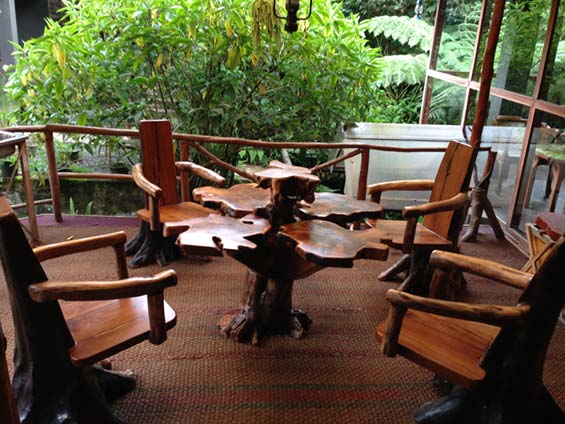
King Fern's in Nouwera Eliya was one of the most interesting places we've seen.
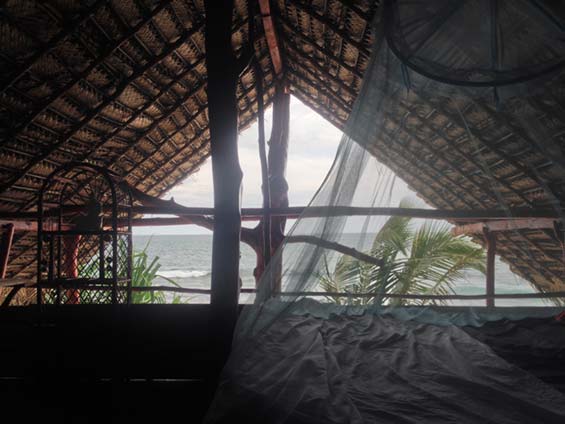
Sandy's cabana in Tangalle.
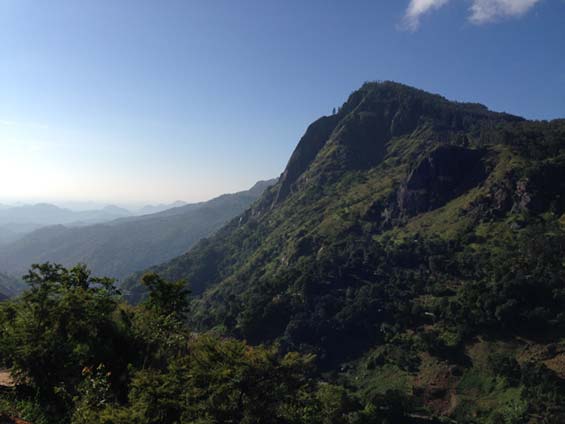
A room with a view - Green Hill in Ella.
People
The people of Sri Lanka are very nice and friendly. They smile a lot and look like they enjoy life. Most are genuinely interested in you, some even want to take pictures with you. Most of them speak English and help you when you are wandering around confused. Opposite to westerners, they don't mind touching each other, and younger people openly flirt. It is very cute when boys are giving girls peanuts and other treats.
The people love their president, whose pictures can be seen everywhere. He is a bit of an emperor, with his brother-in-law running the parliament and a few other relatives on important positions. But he was the one who has ended the 25-year civil war (in 2009), so everybody is just happy to get the chance to live without fear again, supporting this regime.
We've seen a few hustlers, we've even met a junkie in Kandy that approached us with the "I remember you from the hotel" play. These guys usually do Paan, a drug that makes your mouth red and eventually your teeth fall out, but are luckily not that pushy if you ignore them. Another guy wanted to take us a few kilometers too far with his tuk-tuk to earn another buck, while one of them wanted to convince us a bus is not coming. But that a bearable cost for a three week's stay, and even unpleasant locals weren't aggressive.
Even if the people are very sweet, there is one thing that can start getting on your nerves eventually. Everybody wants to sell you something. Food, drinks, ride, accommodation, souvenirs, anything, people constantly approach you, no matter what you are doing. The closer to the beach regions you come, the more of these street sellers there are and after a few weeks, you can get really tired of it.
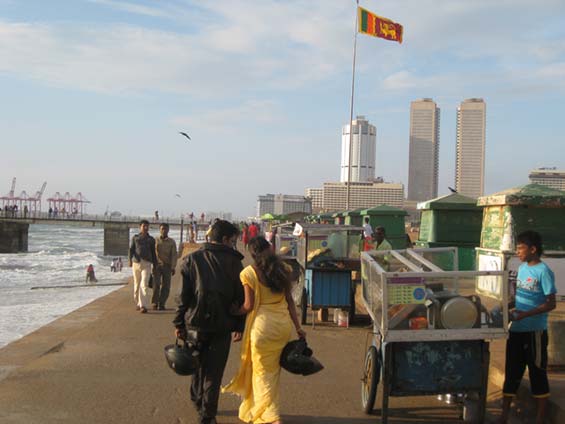
Taking a walk on the beach in Colombo. Life seems pretty modern here.
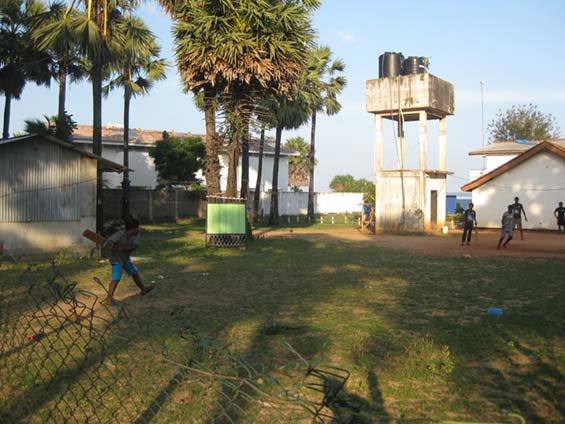
Cricket - the national sport - is played everywhere.
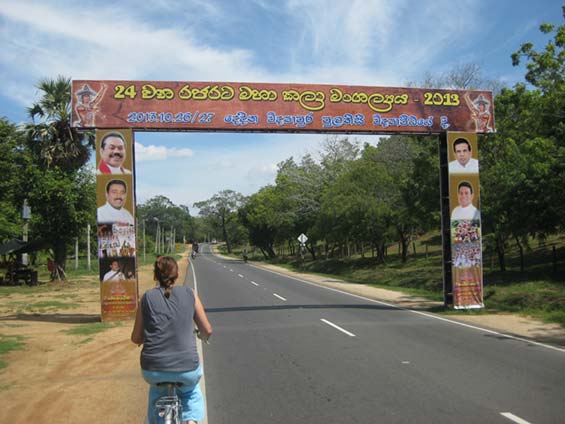
The beloved president and his family.
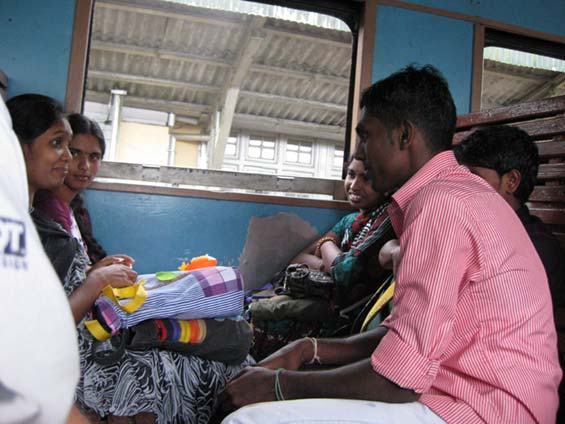
Youngsters flitring on the train. She doesn't seem convinced.
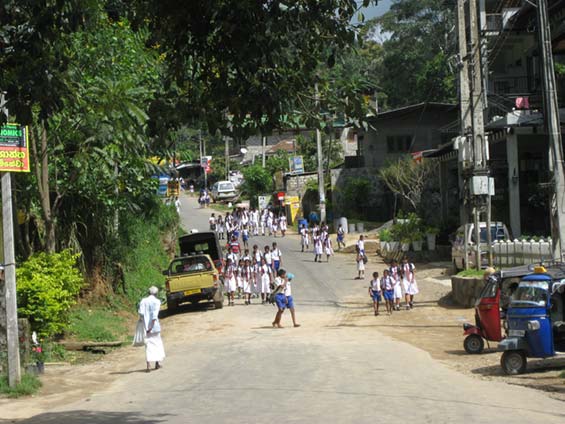
With a generally young population, you can see so many pupils it's almost weird.
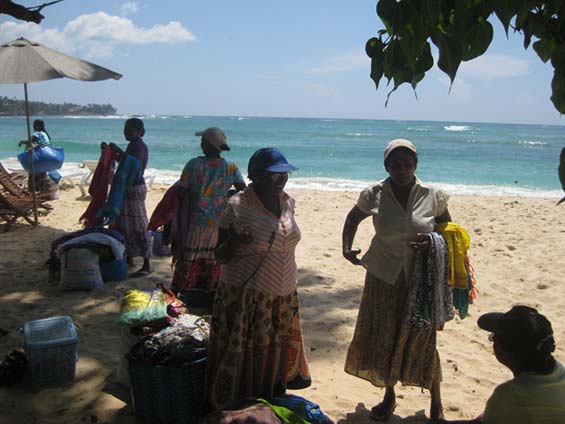
Women preparing for a selling session on the beach.
Cities
Almost everyone's trip starts in Colombo, which is polluted city with over a million inhabitants (Sri Lanka has around 22m in total). The city center offers an interesting amalgamation of asian and modern architecture, and there are quite a few things to see around. The colonial legacy can tell a lot about the previous centuries in Sri Lanka.
A lot of people skip Colombo, but I think it's worth the trip. This is probably the closest Sri Lanka gets to India, and there's nothing like being in a carbon-monixide filled rush hour in a tuk-tuk doing slalom between ongoing traffic.
Other cities are very similar one to another (or so different than European that you don't notice the nuances), busy roads with buses and tuk-tuks, small stores filled with tons of merchandise and decorated with colorful signs, hundreds of people on the streets. Perhaps two cities stand out, Kandy, a colorful city in the middle of the mountains (and in a way even more chaotic than Colombo), and Galle, a colonial fortress in the south, where you feel like you're in Europe.
There are a lot of stray dogs everywhere, and they usually don't look really healthy, so we've tried avoiding them. Small monkeys are also a regular inhabitant of settlements, jumping from tree to tree and going through trash. These guys are a bit more cuter that the dogs, but don't seem that friendly. And of course, cows.
We've seen a few slums as well, but the government is trying to replace them with modern condominiums, so its easy to see these two one next to another. In general, there's a strong contrast between the cities and rural areas, where people usually live in simple huts, hidden in tropical flora.
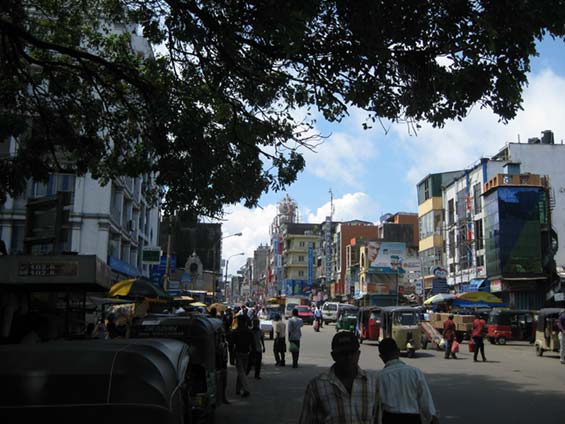
The streets of Colombo.

Stuck in traffic much?
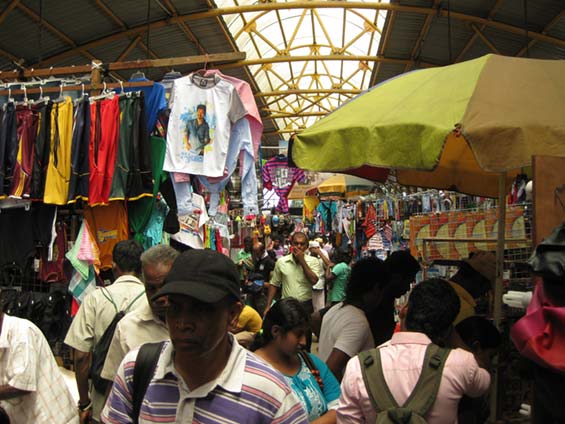
A bazaar in Pettah in Colombo.
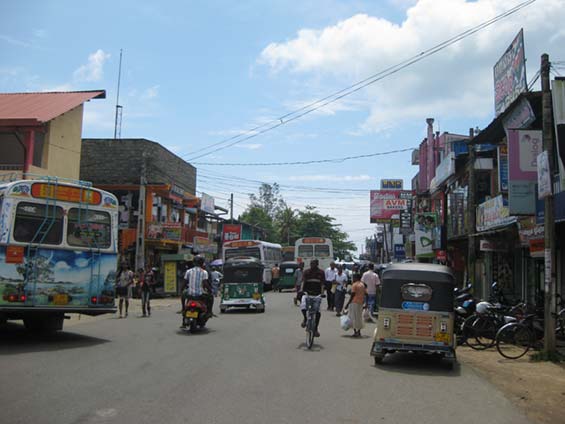
This is how a typical town looks like. This is Weligama.
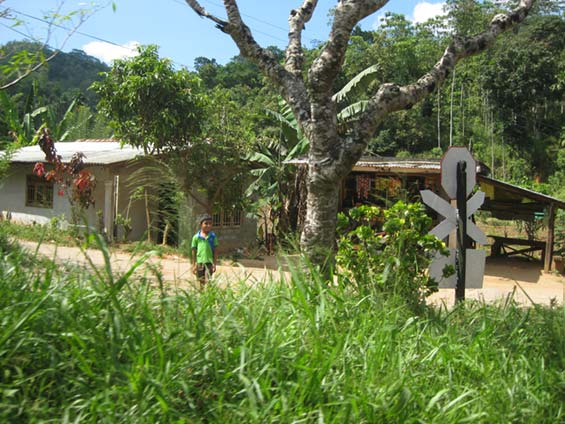
The quiter rural areas.
Temples and ruins
An interesting thing in Sri Lanka are the ancient ruins from around 1000 AD. Our original plan was to go and see a few of them, but ended up seeing only one of them (Polonnaruwa). These things are massive, kilometers wide, and you need a whole day to see everything, even if you rent a bike. Since the weather can get very hot, and the humidity is high, these ruin explorations can become very tiring, so one was enough for us.
There are many Buddhist temples all over the country (one of them supposedly contains the tooth of Buddha), we've seen quite a few of them. Huge statues of Buddha are omnipresent as well, and can be found even in the middle of the jungle.

The ruins of Polonaruwa.
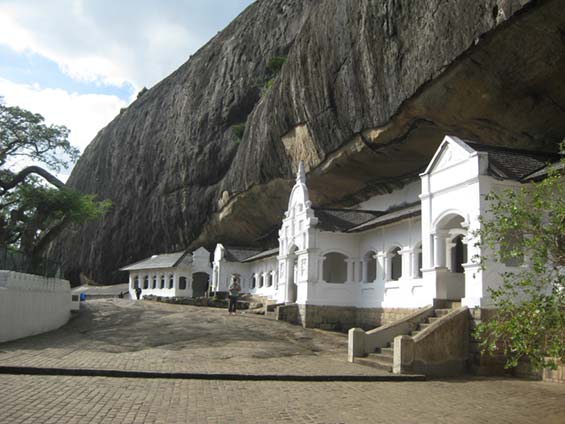
The Cave temple in Dambulla.
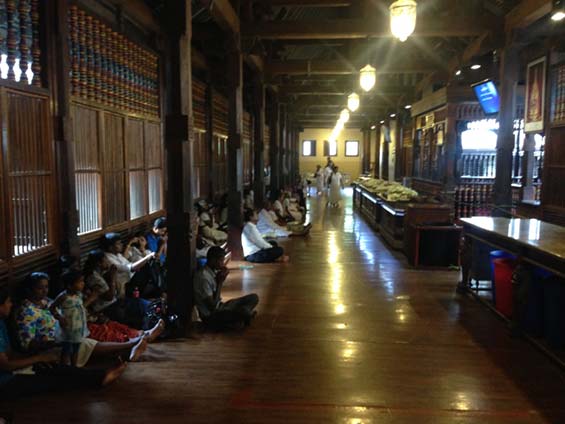
People are praying in the Temple of the tooth in Kandy. Buddha's tooth is supposed to be there.

The statue of Buddha in the middle of the jungle near Sigiriya.
Nature
The nature in Sri Lanka is nothing short of amazing. From old forests to mesmerizing plains, from wildlife parks to tea plantations, which are simply beautiful. Not to mention there's a massive rock (hundreds of meters tall) called the Lion Rock in the middle of nowhere (called Sigiriya), and it's one of the most amazing things we've seen on our trip.
It was so calm and easy in Sigiriya, the chaotic madness just disappeared over there. Other cool things we've did was hiking in Horton Plans (and the World's end), and visiting the Uda Walawe national park, where we've seen things such as elephants, buffaloes, alligators, all sorts of birds and jackals. Our driver on the safari was a crazy guy, so we've ended up full of adrenaline and covered in mud.
There is one downside, though. The entrances to parks and historical sites are very expensive. You can pay around 4.000 Rupees (25 Euro) per person for the entrance fee, which is more than we've both spent for staying the night at our regular place.
Kandy, the cultural capital in the central region, is also a good place to explore nature, since they have a beautiful botanic garden, and you can visit a spice garden where you can see how herbs and spices are grown. Not to mention there is a huge lake in the middle of the city.
We've also went snorkeling to a coral reef in a national park called Pigeon Island, which was a great thing to do as well. Which brings us to...
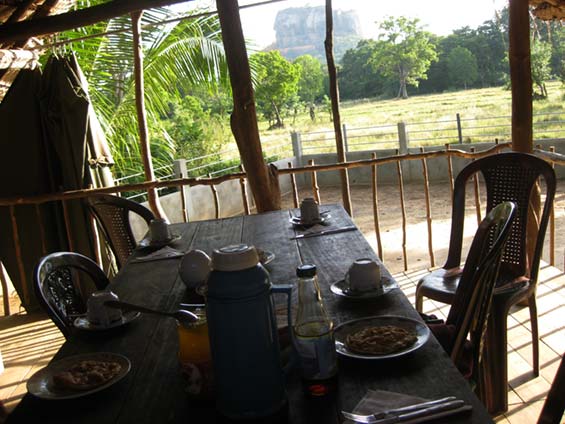
Breakfast with a view over Lion Rock in Sigiriya.
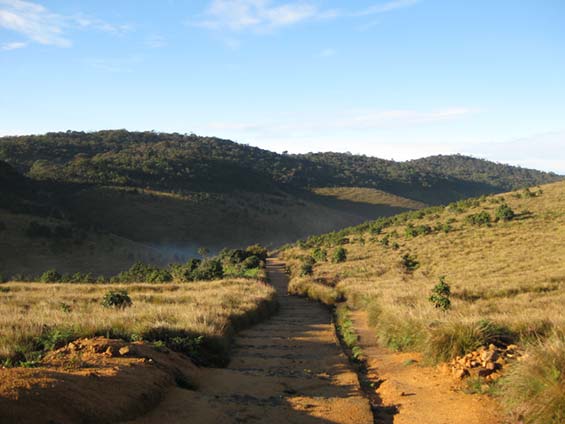
Hiking in Horton Plains was definitely worth it.
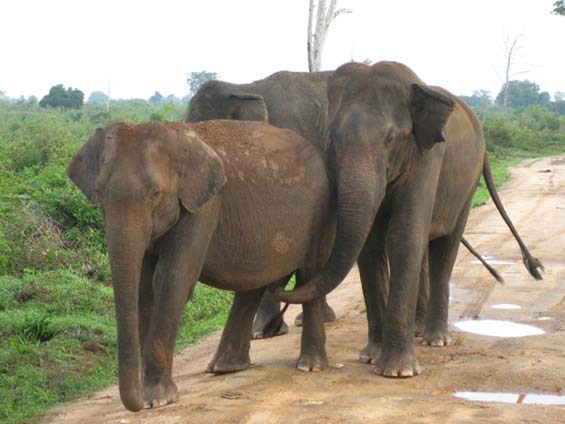
Gay elephants in Uda Walawe national park. They have their own private club.
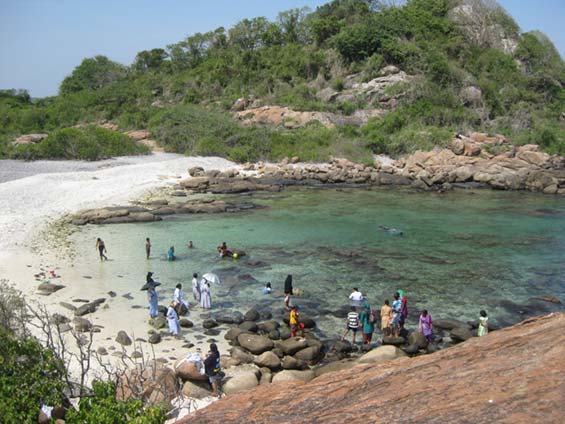
The bautiful Pigeon island.
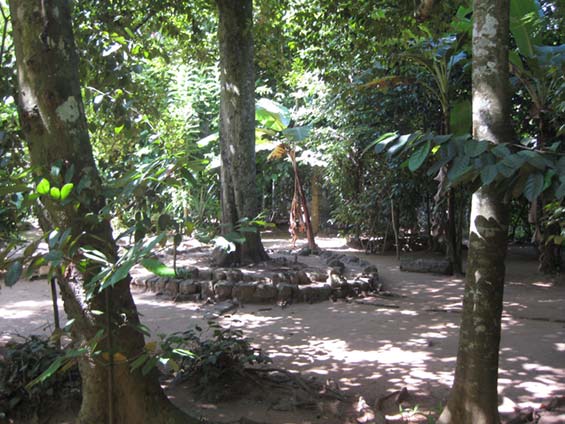
The spice garden in Kandy.
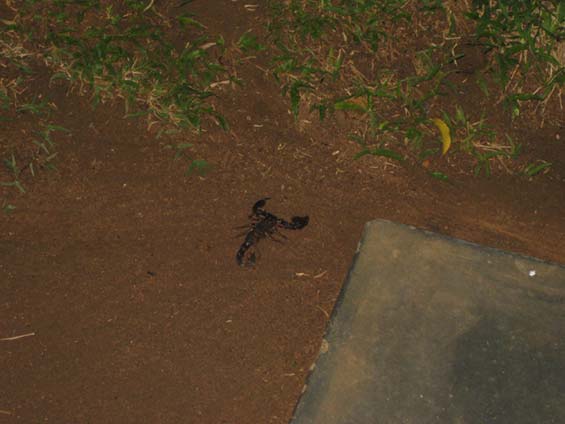
Nature means nature. Close encounter in Sigiriya.
Beaches
One of the most important things in Sri Lanka are the beaches! Paradise beaches, hundreds of them, scattered all across the country. We've been to Uppuveli on the north and a few places to the south, and it kept getting better and better. Crazy sandy beaches and the most amazing surf spots are a common thing in Sri Lanka, but if you're looking for the most beautiful one, Mirissa would be it.
Before we went home, we've stayed our last night in Negombo, a town near the airport. At that point, we were already so spoiled, that the kilometer long sandy beach with a bit of trash and no palm trees seemed too boring to enjoy.
Even though, there's something about these sandy beaches, where you can drink cocktails and eat beautiful food while watching surfers fade into the sunset over the ocean. I love the ocean. You just can't ignore how strong and majestic it is.
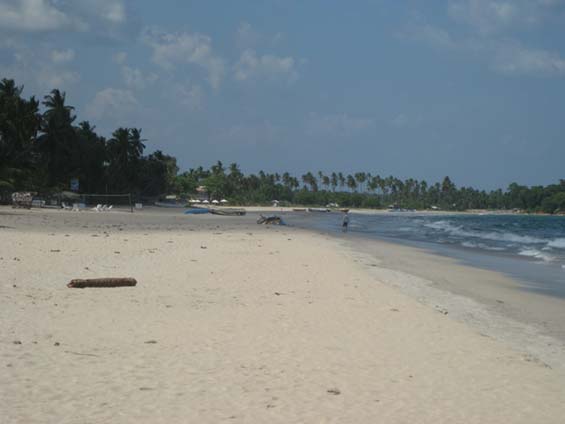
Uppuveli.

Tangalle.
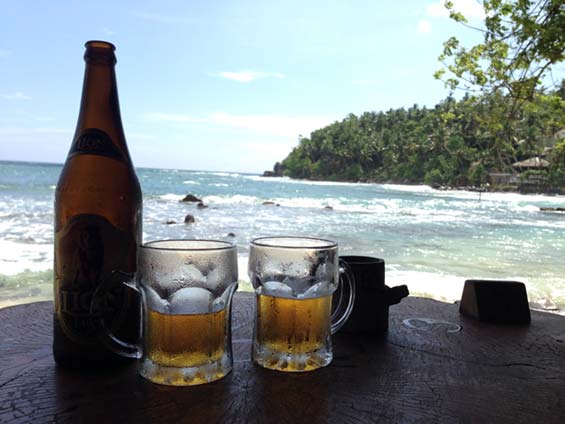
Mirissa.
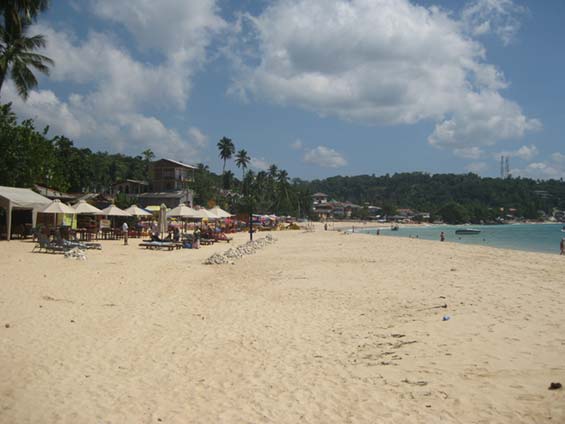
Unawatuna.
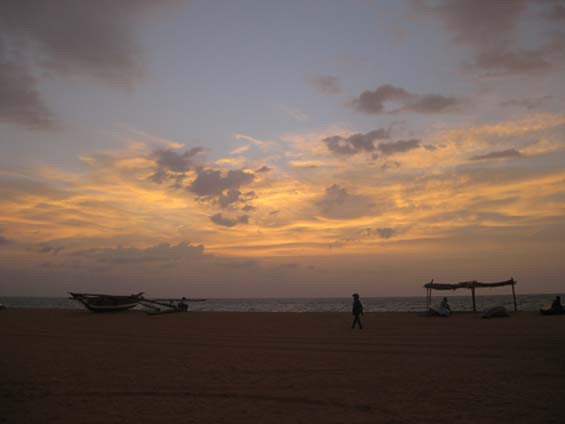
Negombo.
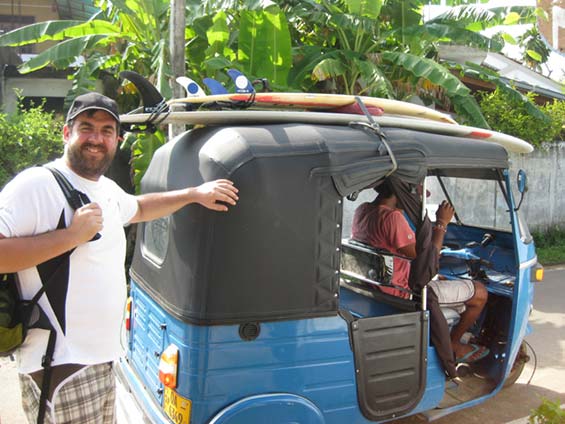
To the surf-tuk-tuk!
Food
I loved Sri Lankan food. It is very spicy, but full of exotic flavors. An ordinary lunch comes with 5 different curries, which will cost you a few Euros in a restaurant (few hundred Rupees). The dishes are usually scarce with meat, but you can still get a beautiful local meat dish Kottu almost everywhere. Things get even better on the seaside, where you can get a freshly caught fish for two for around 10 Euro. Not to mention king prawns and other delicacies.
We've tried to eat in small restaurants (where the locals eat) each time we got the chance. The food is authentic there, not to mention cheap - the least we've payed for a meal was less than two Euro for both. Luckily, they had forks and knives, since the locals usually eat with their hands.
You can get smoothies and lassies (a yoghurt drink) almost everywhere, so you can get a dose of fresh vitamins on a daily basis. We've treated ourselves with one of these almost everyday, but what else can you do in a country where a mango fruit can fall on your head? Eat the most amazing exotic fruit anytime you can. Except papaya. Papaya tastes weird.
However, it's not that easy to find alcohol. There are a lot of bars and restaurants that don't have even beer, but you can compensate for that when you get to the tropical paradise. There's an abundance of everything on the seaside, but the prices also tend to go up a bit as well.
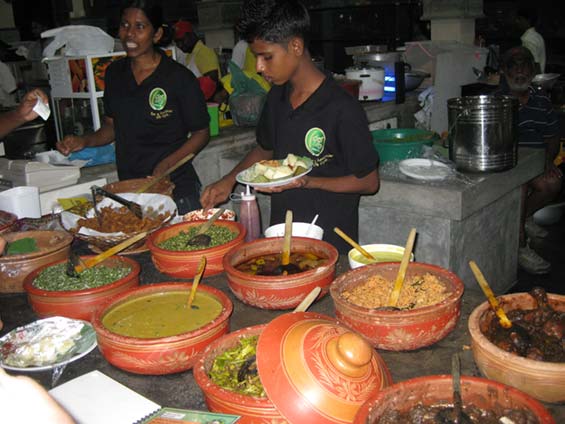
Pick three.
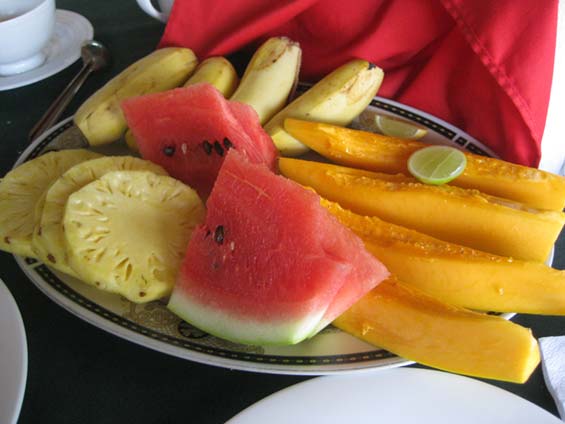
There's plenty of fruit everywhere.
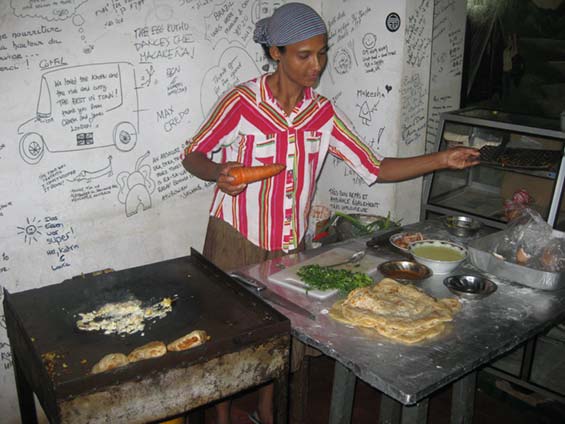
Kottu in the making.
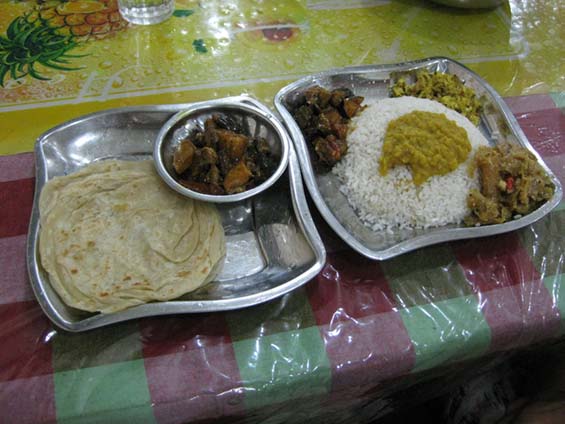
The cheapest meal ever. Both for less than 2 Euro.
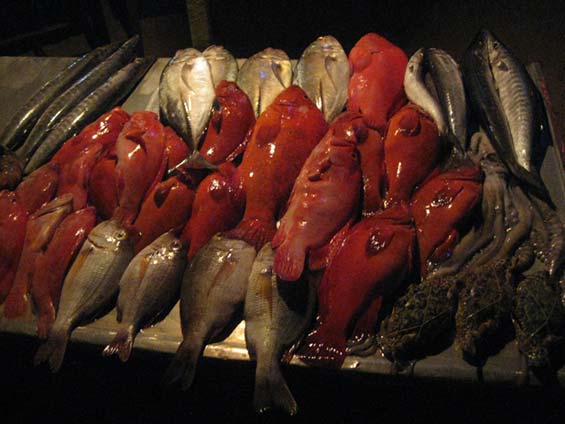
Fresh fish. Too bad barracuda isn't that nice to eat.
Tea
One of the things Sri Lanka is most well known of, is tea. It's the world fourth biggest producer of tea, which means you usually get a whole pot of tea with your breakfast. Tea plantations, which are located in the center of the country, are huge and beautiful, and you can't but admire the fact that every leaf is picked by hand.
Tea plantations also mean tea factories, but we didn't have much luck with them. The first one we've visited (Mackwood) was closed for renovation (prince Charles was supposed to visit it in a few weeks as part of the Commonwealth meeting), and the second one wasn't producing while we were there. But we still managed to get the idea about the massive size of the industry.
Even though I am more of a coffee drinker, I enjoyed tea a few times, and I can say it was very nice. I didn't know there are so many types of it, all made from the same plant. By combining different techniques of roasting and processing, this drink comes in around 20 different versions.
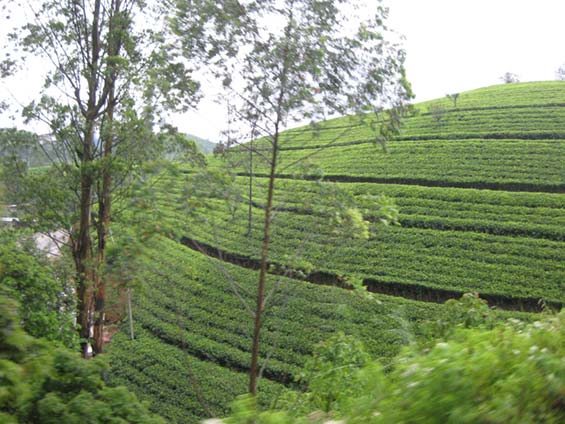
The tea plantations.
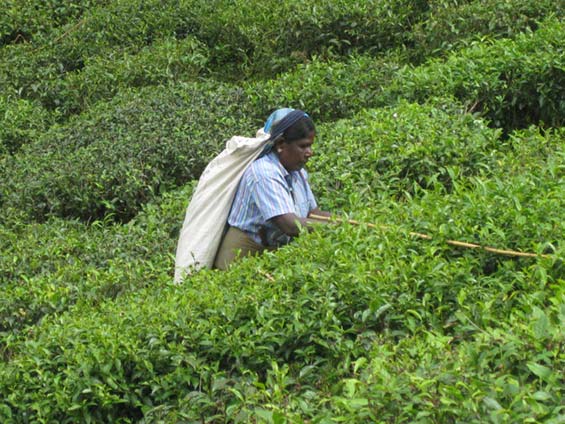
Tea pickers.
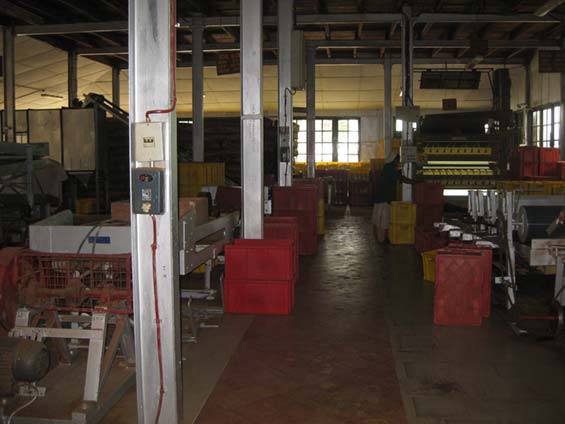
This is how a factory looks like. Too bad it wasn't producing.
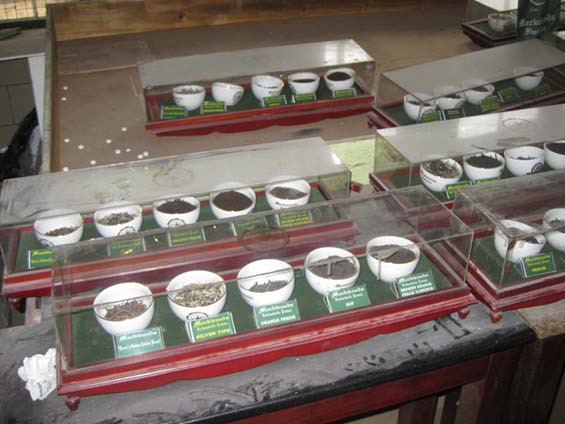
One plant, many varieties.
Ayurveda
If you get too tired, you can treat yourself with some Ayurvedic wellness. Besides massages, this includes all sorts of weird treatments such as sauna caskets and oil dripping on your forehead, which are things you just can't usually do. It was ok, worth trying it out, but not really that special. A Thai massage kicks Ayurvedic ass everyday, if you ask me.

Would you go inside one of these?
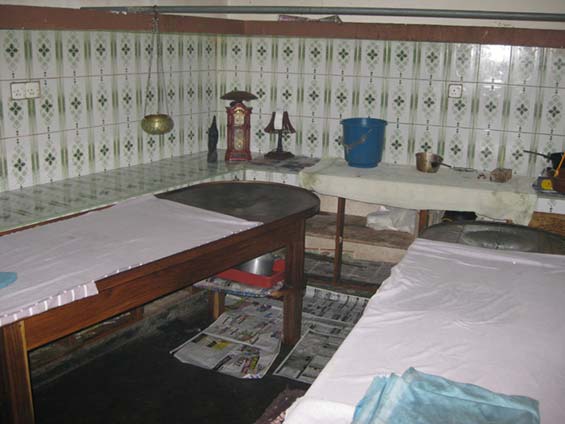
This is the lab in which they pour oil on your forehead.
Our trip
Our trip started in Colombo, from where we've travelled to north-central regions to Dambulla and continued to Sigiriya (staying there instead of Dambulla was a great choice). We've visited the Lion Rock and the ruins of Polonnaruwa from there, and continued our journey to north-east. We've chilled out a bit on the beaches of Uppuveli, did the snorkeling on Pigeon Island and took the bus to Kandy. After a few days in the jungle we took the train to Nuwara Eliya, which is a great place to do the tea-seeing. In the morning, a driver took us to Horton Plains and dropped us off at the train station, from where we wen't to the place with the most amazing view, Ella.
At this point, we were around three thirds into our three-week journey. After visiting the Uda Walave park, we've continued our way to the south - entering the laid back part of the trip. The beaches of Tangalle and Mirissa were amazing, and the colonial city of Galle offered a most pleasant stay. Our last night was in the west near the airport on the beaches of Negombo.
We have stayed in 10 places in 20 days, and I would recommend every single one of them:
We have spent around 1350 Euro per person in total, out of which:
- 700 Euro for the plain tickets
- 200 Euro for food and drinks
- 150 Euro for sleeping
- 100 Euro for traveling around
- 100 Euro for the entrance fees
- 100 Euro for insurance and other expenses
Here is our itinerary:
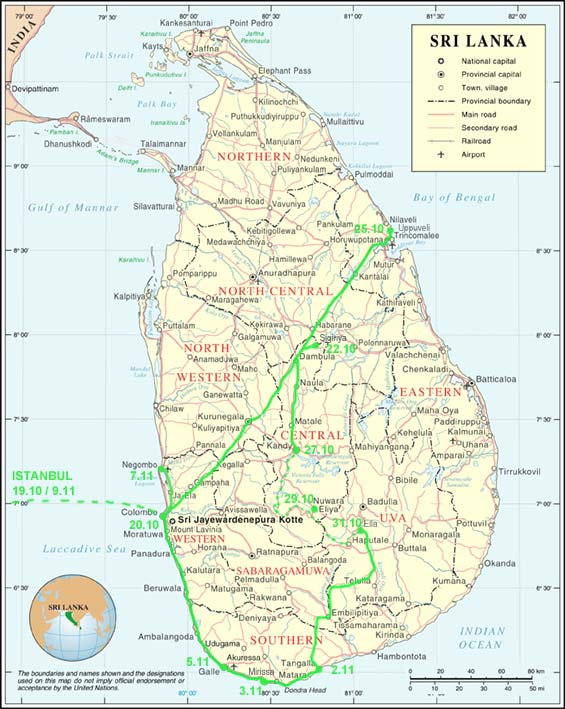
This is what you can do in three weeks in Sri Lanka.
Conclusion
Sri Lanka is an amazing country, and I would highly recommend visiting it. It's wild enough to get you running around, and tame enough to let you relax after the chaos. The trip can be quite inexpensive, since even the budget rooms are nice and clean, and you can get around very cheap if you use the public transport. You will get the chance to see many busy cities and laid-back villages.
The people of Sri Lanka are very nice and polite, and there are plenty of natural and cultural spots you can visit. But in the end, you probably find yourself enjoying the paradise beaches the most, hanging out with surfers and other travellers. Good food will be your everyday partner, just be careful not to order too spicy.
In the end, Sri Lanka offers plenty of options that can help you enjoy its authentic life. After all, that is what Asia is all about - discovering beautiful places and fascinating culture.